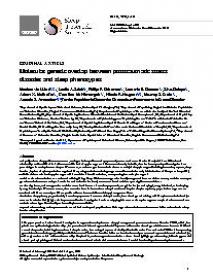Molecular genetic overlap between posttraumatic stress disorder and sleep phenotypes
Study Objectives: Sleep problems are common, serving as both a predictor and symptom of posttraumatic stress disorder (PTSD), with these bidirectional relationships well established in the literature. While both sleep phenotypes and PTSD are moderately heritable, there has been a paucity of investigation into potential genetic overlap between sleep and PTSD. Here, we estimate genetic correlations between multiple sleep phenotypes (including insomnia symptoms, sleep duration, daytime sleepiness, and chronotype) and PTSD, using results from the largest genome-wide association study (GWAS) to date of PTSD, as well as publicly available GWAS results for sleep phenotypes within UK Biobank data (23 variations, encompassing four main phenotypes).
Methods: Genetic correlations were estimated utilizing linkage disequilibrium score regression (LDSC), an approach that uses GWAS summary statistics to compute genetic correlations across traits, and Mendelian randomization (MR) analyses were conducted to follow up on significant correlations.
Results: Significant, moderate genetic correlations were found between insomnia symptoms (rg range 0.36–0.49), oversleeping (rg range 0.32–0.44), undersleeping (rg range 0.48–0.49), and PTSD. In contrast, there were mixed results for continuous sleep duration and daytime sleepiness phenotypes, and chronotype was not correlated with PTSD. MR analyses did not provide evidence for casual effects of sleep phenotypes on PTSD.
Conclusion: Sleep phenotypes, particularly insomnia symptoms and extremes of sleep duration, have shared genetic etiology with PTSD, but causal relationships were not identified. This highlights the importance of further investigation into the overlapping influences on these phenotypes as sample sizes increase and new methods to investigate directionality and causality become available.
Geachte bezoeker,
De informatie die u nu opvraagt, kan door psychotraumanet niet aan u worden getoond. Dit kan verschillende redenen hebben,
waarvan (bescherming van het) auteursrecht de meeste voorkomende is. Wanneer het mogelijk is om u door te verwijzen naar de bron
van deze informatie, dan ziet u hier onder een link naar die plek.
Als er geen link staat, kunt u contact opnemen met de bibliotheek,
die u verder op weg kan helpen.
Met vriendelijke groet,
Het psychotraumanet-team.
In: Sleep ; ISSN 0161-8105 | 43 | 4 | april | zsz257
https://academic.oup.com/sleep/article-abstract/43/4/zsz257/5658424


